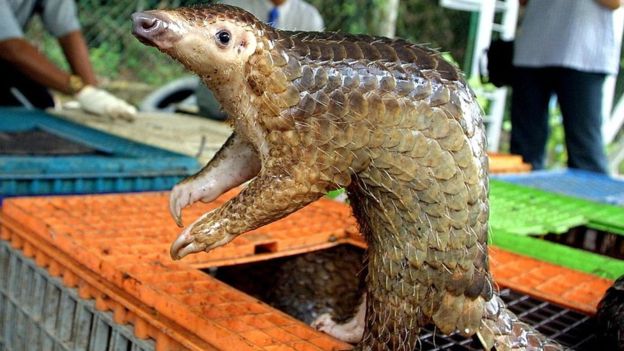The Wuhan wet market was not the origin of the coronavirus pandemic as previously thought, studies show, but may have been the site of a super-spreader event.
Genetic evidence has confirmed that the virus originated in Chinese bats before it jumped to humans, but the exact location of the transition is unknown.
Originally Chinese authorities said the first cases of the virus emerged at the local seafood market, but a new investigation of the animals being sold ruled that out.
The Chinese Centres for Disease Control and Prevention took samples of the animals in the market and found none of them had coronavirus.
As the animals in the market were negative for coronavirus it means they can't have infected shoppers.
This led to the new theory that someone visiting the market had already contracted COVID-19 and became a super-spreader - giving it to many others.
The Chinese CDC said 'it turns out the the wet market was a victim of the virus'.
A majority of the original 41 cases of COVID-19 reported to the World Health Organisation in December were linked to the 116 acres market.
This led to the wet market being shut down on January 1 - the majority of its 3,600 shops had reopened by April 14, according to reports.
The virus was likely circulating in Wuhan before those first 41 cases were reported.
In fact, 13 of the original cases showed no link to the wet market, according to the Chinese CDC study.
Research from January showed the first person confirmed to have coronavirus was likely exposed as early as December 1 - showing symptoms on December 8.
Carlson said the idea of the wet market being the origin had become a useful narrative but the evidence hasn't been particularly conclusive.
The narrative came from the fact wet markets sell exotic, endangered and trafficked animals that could be the link between bats and humans.
The fact none of the animals in the market that were sampled tested positive led to the super-spreader theory.
It wouldn't be the only super-spreader event - as the virus progressed and spread around the world a number of infected individuals caused clusters of infections.
'The novel coronavirus overturns much of what people have known and many of its patterns are beyond our cognition,' said George Gao Fu of the Chinese CDC.
It could be some times before we know exactly what animal caused the virus to spread from bats to humans or even when - it's taken months to rule out one site.
'That takes time. The study that really definitively showed the bats that SARS came from was published in 2017,' - 15 years after SARS first broke out.
'It took that long to go through caves, to go through samples, and build an evidence base where we could confidently say: 'This was the sort of bat, in this cave, at this time,' Carlson said.
Latest Stories
-
IFRS 17 is one of biggest changes to financial reporting standards in insurance industry – Deloitte
10 mins -
Enimil Ashon: Whose polls do you believe: ‘Global Info or Prof Sarpong?
13 mins -
Ghana Climate Innovation Centre welcomes 25 businesses into Cohort 10
17 mins -
ADB will continue to enhance customer value and service experience – Managing Director
19 mins -
Colour Cure Exhibition highlights art’s role in healing and advocacy
21 mins -
GPL 2024/25: Aduana FC sack coach Yaw Acheampong after poor run
24 mins -
John Dumelo pays ¢10,400 in outstanding fees for visually impaired law student facing deferral
25 mins -
CHRAJ clears Rev. Kusi Boateng of conflict of interest, says he doesn’t own 2 passports with different names
29 mins -
We’ll restore hope by cutting down taxes and avoiding unreasonable borrowing – Ato Forson
33 mins -
14th Edition of Tech in Ghana Conference launched in Accra
34 mins -
Manifesto clash: NPP, NDC spar over water, hygiene, sanitation and climate change
40 mins -
Ellembelle MP constructs new health facility at Santaso to serve several communities
44 mins -
Kwasi Appiah wanted to axe Ayew brothers and Wakaso from Black Stars – Ernest Thompson reveals
52 mins -
AngloGold Ashanti empowers PWDs in Obuasi East to harness 10-year socio-economic development plan
55 mins -
‘Dumsor’ won’t go anytime soon, we need 2 years to stabilize- IES
1 hour

